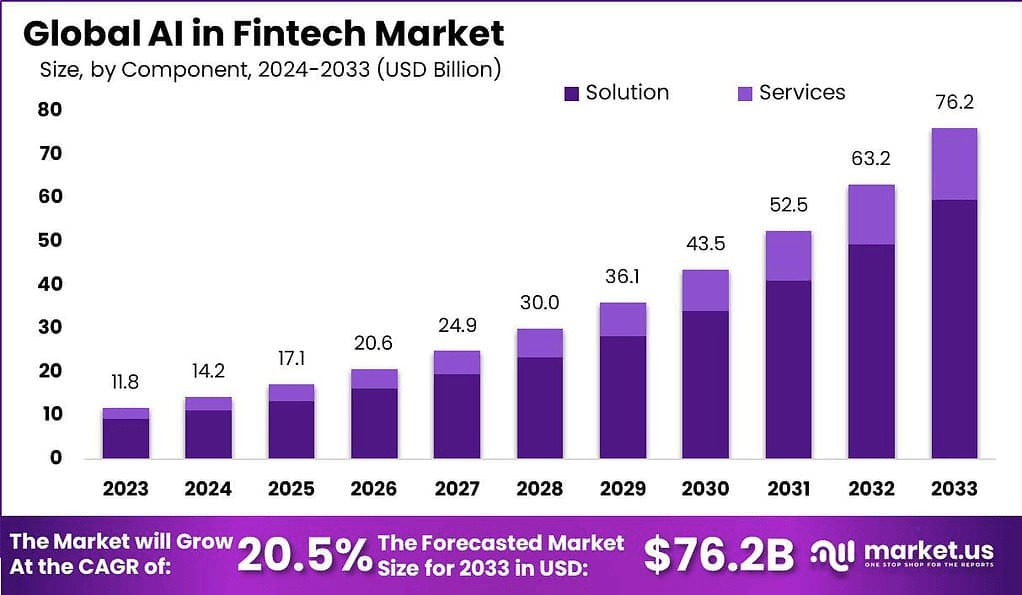Introduction
The AI in Fintech Market is reshaping the financial services landscape by integrating intelligent algorithms into processes such as risk management, fraud detection, credit scoring, robo-advisory, and customer service. As financial institutions strive to deliver faster, more personalized, and secure services, AI technologies such as machine learning, natural language processing, and predictive analytics are becoming core to innovation. From automating back-office operations to enhancing real-time decision-making, AI is transforming fintech into a more agile, efficient, and customer-centric industry, driving a fundamental shift in how financial products are developed, distributed, and consumed.

Key Takeaways
AI adoption in fintech is fueled by the demand for automation, real-time insights, fraud prevention, and hyper-personalized user experiences. Key drivers include the rise of digital banking, the explosion of financial data, and increasing customer expectations for seamless digital interactions. AI enhances financial forecasting, streamlines compliance through RegTech, and reduces operational costs. North America leads the market due to mature fintech infrastructure and innovation hubs, while Asia-Pacific is witnessing the fastest growth driven by mobile-first economies and government support for AI and digital payments. Ethical AI and data privacy remain crucial concerns amid this rapid evolution.
Component Analysis
The core components of AI in fintech include machine learning models, natural language processing (NLP), predictive analytics platforms, robotic process automation (RPA), and AI-powered APIs. Machine learning is used extensively for credit risk assessment, algorithmic trading, and customer segmentation. NLP powers chatbots, virtual assistants, and sentiment analysis, enabling more intuitive customer engagement. Predictive analytics forecasts market trends and financial behaviors, while RPA automates repetitive processes like KYC (Know Your Customer) and compliance reporting. AI APIs integrate these capabilities into mobile banking apps, lending platforms, and investment tools, enhancing scalability and speed.
Service Analysis
AI-enabled services in fintech span across robo-advisory, fraud detection and prevention, credit scoring, chatbots and virtual assistants, risk management, and regulatory compliance solutions (RegTech). Robo-advisors provide algorithm-driven portfolio management, making investment accessible to a broader audience. AI-based fraud detection services monitor transactions in real time to identify anomalies and prevent financial crimes. Lenders use AI to provide alternative credit scoring based on behavioral and transactional data, expanding access to credit. Meanwhile, RegTech solutions help financial institutions automate regulatory reporting and compliance checks, ensuring accuracy and reducing penalties.
Key Player Analysis
Major players in the AI in fintech market include IBM, Google Cloud, Microsoft, Amazon Web Services (AWS), FICO, Upstart, PayPal, Zest AI, and Darktrace. IBM and Google provide enterprise-grade AI tools for fraud detection, compliance, and financial modeling. Microsoft Azure enables scalable AI deployment in digital banking and payments. Startups like Upstart and Zest AI are disrupting lending with advanced AI credit models, while Darktrace uses AI for real-time cybersecurity threat detection in financial institutions. Fintech platforms such as PayPal and Stripe are integrating AI to optimize payments, prevent fraud, and improve customer experience.
Top Market Leaders
- IBM Corporation
- Microsoft Corporation
- Google LLC
- Amazon Web Services, Inc.
- Nuance Communications, Inc.
- Axyon AI
- ForwardLane
- Salesforce, Inc.
- SAS Institute Inc.
- Mastercard Inc
- Inbenta Technologies Inc.
- Amelia.ai
- Other Key Players
Conclusion
AI is becoming the heartbeat of modern fintech, enabling smarter, faster, and more secure financial services. As technology matures and regulatory clarity improves, AI in fintech will continue to drive innovation—from democratizing access to credit and wealth management to fortifying cybersecurity and compliance. The future of finance lies in intelligent automation, and AI is at its very core.
The macro analyst desk brings highly sought after financial news based on market analysis, insider news and company filings.
